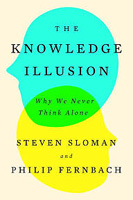
|
 |
The Knowledge Illusion: Why We Never Think Alone Steven Sloman and Philip Fernbach 
Format: Paperback, 304pp. ISBN: 9780399184369 Publisher: Riverhead Books Pub. Date: March 13, 2018 Average Customer Review: For Bulk Orders Call: 626-441-2024 Description and Reviews From The Publisher: “The Knowledge Illusion is filled with insights on how we should deal with our individual ignorance and collective wisdom.” —Steven Pinker We all think we know more than we actually do. Humans have built hugely complex societies and technologies, but most of us don’t even know how a pen or a toilet works. How have we achieved so much despite understanding so little? Cognitive scientists Steven Sloman and Philip Fernbach argue that we survive and thrive despite our mental shortcomings because we live in a rich community of knowledge. The key to our intelligence lies in the people and things around us. We’re constantly drawing on information and expertise stored outside our heads: in our bodies, our environment, our possessions, and the community with which we interact—and usually we don’t even realize we’re doing it. The human mind is both brilliant and pathetic. We have mastered fire, created democratic institutions, stood on the moon, and sequenced our genome. And yet each of us is error prone, sometimes irrational, and often ignorant. The fundamentally communal nature of intelligence and knowledge explains why we often assume we know more than we really do, why political opinions and false beliefs are so hard to change, and why individually oriented approaches to education and management frequently fail. But our collaborative minds also enable us to do amazing things. This book contends that true genius can be found in the ways we create intelligence using the world around us. Reviews “In an increasingly polarized culture where certainty reigns supreme, a book advocating intellectual humility and recognition of the limits of understanding feels both revolutionary and necessary. The fact that it’s a fun and engaging page-turner is a bonus benefit for the reader.” —Publishers Weekly “We all know less than we think we do, including how much we know about how much we know. There’s no cure for this condition, but there is a treatment: this fascinating book. The Knowledge Illusion is filled with insights on how we should deal with our individual ignorance and collective wisdom.” —Steven Pinker, Johnstone Family Professor of Psychology, Harvard University, and author of How the Mind Works and The Stuff of Thought “I love this book. A brilliant, eye-opening treatment of how little each of us knows, and how much all of us know. It's magnificent, and it's also a lot of fun. Read it!” —Cass R. Sunstein, coauthor of Nudge and founder and director, Program on Behavioral Economics and Public Policy, Harvard Law School “Steven Sloman and Philip Fernbach are experts on ignorance. Their absorbing book reveals all the ways we delude ourselves into thinking we know more than we do.” —Jonah Berger, author of Contagious and Invisible Influence “Cognitive science attempts to understand the workings of the individual mind. In this brilliant book, Steven Sloman and Philip Fernbach show us that what cognitive science has learned is how much the individual mind depends on the minds of others. No matter how smart we are, as individuals we know (almost) nothing. Reading this book will inspire you to cultivate your own expertise, but even more, it will inspire you to seek out and appreciate the expertise of others. This book is a blueprint for an enlightened society.” —Barry Schwartz, author of The Paradox of Choice, Practical Wisdom, and Why We Work “We radically overestimate how much we know. In this fascinating book, Steven Sloman and Philip Fernbach examine the origin and consequences of this knowledge illusion, exploring both the extent of our ignorance and the clever ways in which we overcome it. This is an exceptionally clear and well-reasoned book, and it has some important and radical things to say about everything from the allure of stories to how iPhones make us smarter to the pros and cons of democracy. This is psychology at its best.” —Paul Bloom, Professor of Psychology at Yale University, and author of Against Empathy: The Case for Rational Compassion
About the Authors Steven Sloman is a professor of cognitive, linguistic, and psychological sciences at Brown University. He is the editor in chief of the journal Cognition. He lives with his wife in Providence, Rhode Island. His two children have flown the coop. Philip Fernbach is a cognitive scientist and professor of marketing at the University of Colorado’s Leeds School of Business. He lives in Boulder, Colorado, with his wife and two children. |
|

The Essential Lists BOOKS TO READ BEFORE YOU LEAD 
Grow Your Leadership Skills NEW AND UPCOMING LEADERSHIP BOOKS 
Classic Leadership Books BOOKS TO READ BEFORE YOU LEAD |
 |
| ||
 | © 2020 LeadershipNow™ All materials contained in https://www.LeadershipNow.com are protected by copyright and trademark laws and may not be used for any purpose whatsoever other than private, non-commercial viewing purposes. Derivative works and other unauthorized copying or use of stills, video footage, text or graphics is expressly prohibited. |
||